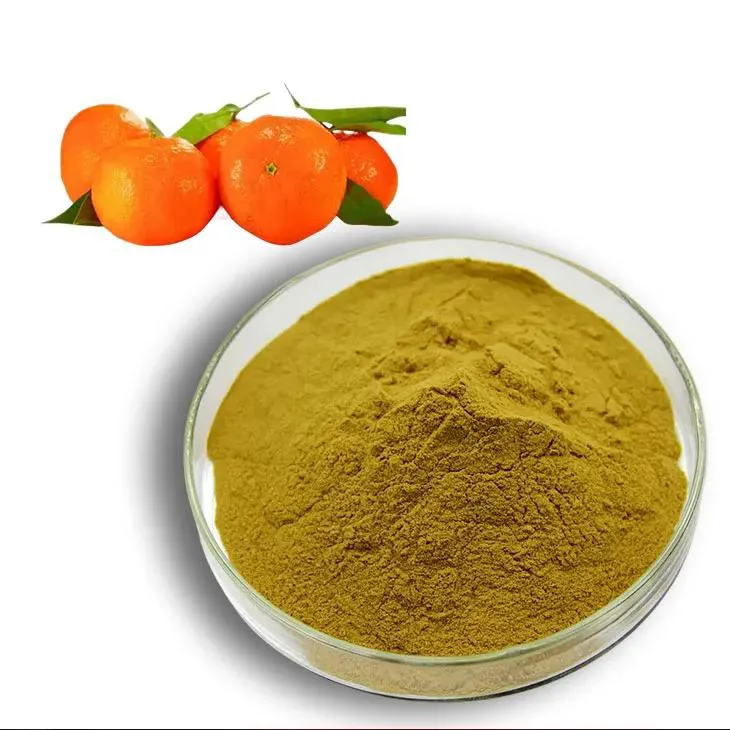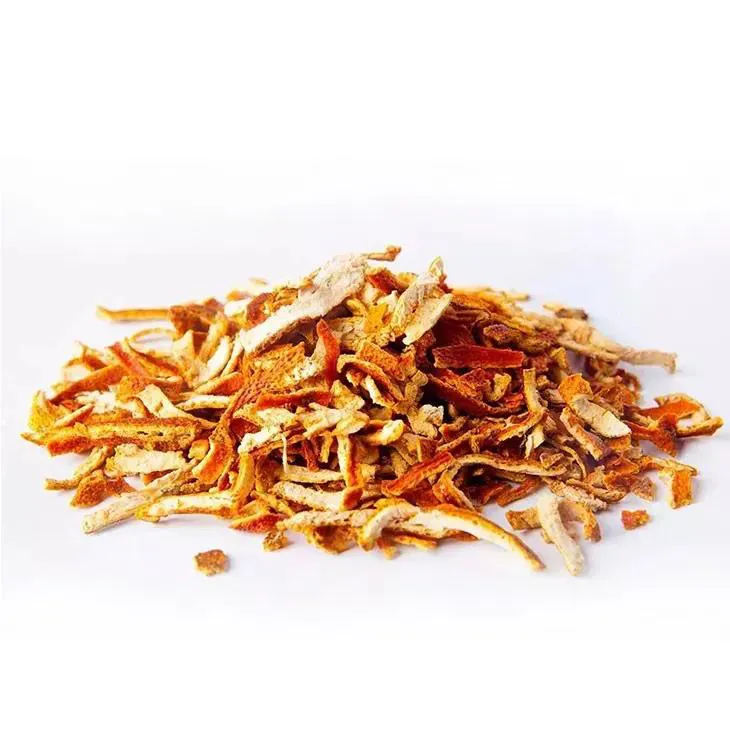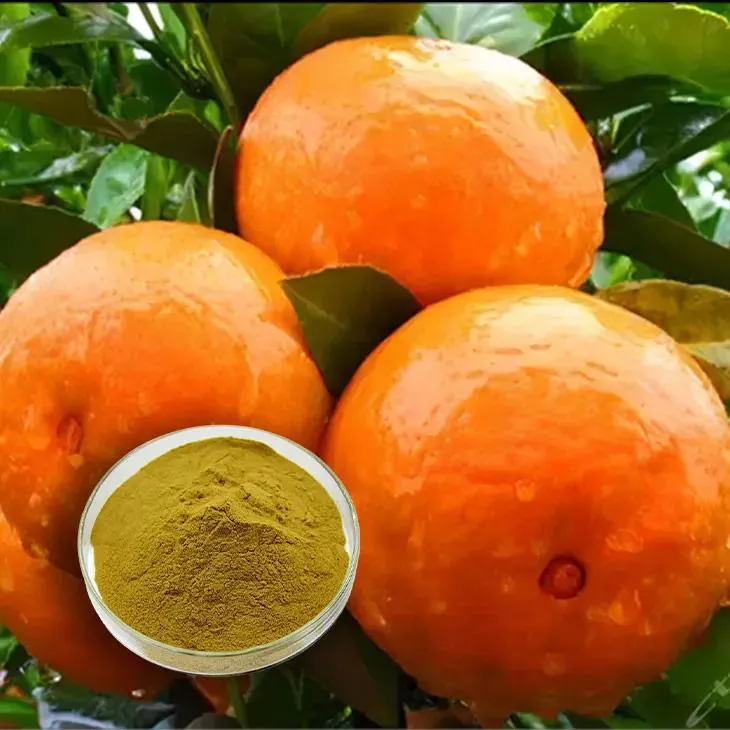- 0086-571-85302990
- sales@greenskybio.com
What is the Purpose of Citrus Bioflavonoids?
2025-10-25

Citrus bioflavonoids, also known as flavonoids or vitamin P, are a diverse group of plant compounds naturally found in the peel, pulp, and juice of citrus fruits such as oranges, lemons, limes, and grapefruits. They are recognized for their antioxidant, anti-inflammatory, and vascular-supportive properties, making them increasingly popular in both nutritional science and dietary supplementation. While bioflavonoids are often associated with vitamin C, their role in human health is distinct, complementing other nutrients and contributing to a wide range of physiological functions. This article explores the purpose of citrus bioflavonoids,their mechanisms of action, and the benefits they may provide for the body.
How Do Citrus Bioflavonoids Work in the Body?
Citrus bioflavonoids exert their effects primarily through antioxidant, anti-inflammatory, and vascular-support mechanisms. As antioxidants, they neutralize free radicals and reduce oxidative stress, which is a key contributor to cellular aging, inflammation, and chronic disease development. They also enhance the activity of other antioxidants, such as vitamin C, creating a synergistic effect that amplifies their protective benefits.
In addition to their antioxidant properties, citrus bioflavonoids support vascular health by strengthening capillaries, improving blood vessel elasticity, and reducing permeability. This can decrease the risk of bruising, varicose veins, and other circulatory issues. By influencing the production of nitric oxide in endothelial cells, bioflavonoids can also support healthy blood flow and blood pressure regulation.
Citrus bioflavonoids may also modulate immune responses, reduce inflammation, and affect enzyme activity, further highlighting their multifaceted role in maintaining overall health.

Do Citrus Bioflavonoids Support Cardiovascular Health?
One of the primary purposes of citrus bioflavonoids is cardiovascular support. Numerous studies have demonstrated that these compounds can improve heart health by reducing oxidative damage to blood lipids, supporting arterial elasticity, and lowering blood pressure. By preventing LDL cholesterol oxidation, they reduce the risk of atherosclerosis, a condition in which plaque builds up in the arteries.
Moreover, certain flavonoids like Hesperidin and naringenin, found abundantly in citrus fruits, have been shown to enhance endothelial function and improve microcirculation. This can contribute to better blood flow, reduced inflammation in vascular tissues, and overall cardiovascular resilience. Regular consumption of citrus bioflavonoids, whether through diet or supplementation, may therefore be a strategic approach for maintaining long-term heart health.

Do Citrus Bioflavonoids Enhance Immune Function?
Citrus bioflavonoids play a supportive role in immune function, particularly through their antioxidant and anti-inflammatory properties. By mitigating oxidative stress, they help preserve the integrity of immune cells and support their ability to respond to pathogens. Some research also indicates that flavonoids can modulate the activity of cytokines and other immune signaling molecules, enhancing the body’s natural defenses without overstimulating the immune system.
Additionally, bioflavonoids are often found in combination with vitamin C in citrus fruits, which further amplifies immune benefits. While they are not a cure or treatment for infections, their presence in the diet can support a more balanced and resilient immune response.

Do Citrus Bioflavonoids Improve Skin Health?
Citrus bioflavonoids may contribute to skin health through several mechanisms. Their antioxidant activity helps protect skin cells from free radical damage, which can lead to premature aging, fine lines, and loss of elasticity. They also promote collagen stability by reducing oxidative damage to connective tissue, which can improve skin firmness and resilience.
Some studies suggest that bioflavonoids enhance the skin’s microcirculation, providing better nutrient and oxygen delivery to skin cells. This may result in improved skin tone and overall radiance. When combined with topical vitamin C, citrus bioflavonoids may further support photoprotection and repair from UV-induced oxidative stress.
Do Citrus Bioflavonoids Support Circulatory Health?
Citrus bioflavonoids are particularly known for their ability to strengthen capillaries and small blood vessels, making them valuable for circulatory health. They reduce capillary permeability and fragility, which can prevent excessive bruising and swelling. This property is especially beneficial for individuals with conditions such as varicose veins or hemorrhoids.
Hesperidin, in particular, has been studied for its effects on venous tone and microvascular integrity. Supplementation with Hesperidin-rich extracts has been shown to reduce symptoms like leg heaviness, swelling, and discomfort in people with chronic venous insufficiency. By supporting the structural integrity of blood vessels, citrus bioflavonoids play a preventative and protective role in maintaining healthy circulation.
Do Citrus Bioflavonoids Support Anti-Inflammatory Processes?
Inflammation is a natural immune response, but chronic low-grade inflammation is linked to many health issues, including cardiovascular disease, diabetes, and joint disorders. Citrus bioflavonoids can help regulate inflammatory pathways by inhibiting the production of pro-inflammatory molecules and reducing oxidative stress, which often exacerbates inflammation.
Research indicates that flavonoids like naringin and Quercetin can modulate enzyme activity involved in inflammatory processes, reducing the expression of molecules that drive tissue damage. This anti-inflammatory action contributes to the overall protective role of citrus bioflavonoids in maintaining systemic health.
Can Citrus Bioflavonoids Support Metabolic Health?
Emerging research suggests that citrus bioflavonoids may influence metabolic health, including glucose regulation and lipid metabolism. Some studies indicate that hesperidin and naringin can improve insulin sensitivity, reduce blood glucose levels, and modulate lipid profiles. By supporting healthy blood sugar regulation and improving cholesterol balance, these compounds may play a preventative role in metabolic disorders such as type 2 diabetes and metabolic syndrome.
Additionally, their antioxidant and anti-inflammatory properties contribute to reducing oxidative stress in tissues, which is often elevated in metabolic disease. While more research is needed to establish clinical recommendations, these findings highlight the broad systemic benefits of citrus bioflavonoids.
What Are the Natural Sources of Citrus Bioflavonoids?
Citrus bioflavonoids are abundant in the peel, pulp, and juice of citrus fruits. Oranges, lemons, limes, grapefruits, tangerines, and pomelos are particularly rich in these compounds. Hesperidin is predominantly found in oranges and lemons, while naringin is abundant in grapefruits. Quercetin and rutin are also present in smaller amounts in citrus fruits.
For optimal absorption, it is recommended to consume whole fruits or minimally processed products, as bioflavonoids are often concentrated in the peel and membranes. Supplements are available and can provide standardized doses, but dietary sources also deliver synergistic nutrients, including vitamin C, potassium, and fiber.
Are There Risks or Limitations to Citrus Bioflavonoid Intake?
Citrus bioflavonoids are generally considered safe when consumed in typical dietary amounts. However, concentrated supplements may interact with certain medications, particularly those metabolized by liver enzymes such as cytochrome P450. For example, grapefruit-derived flavonoids can alter the metabolism of specific drugs, potentially leading to increased blood levels and side effects.
Individuals with citrus allergies should also avoid high-dose supplements. Additionally, excessive supplementation without medical supervision may not provide additional benefits and could cause gastrointestinal discomfort in some cases. Overall, consuming citrus bioflavonoids through a balanced diet remains the safest and most effective approach.
How Can One Incorporate Citrus Bioflavonoids into a Healthy Lifestyle?
To leverage the benefits of citrus bioflavonoids, incorporating a variety of citrus fruits into daily meals is key. Fresh fruit, juice (preferably without added sugar), zest, and minimally processed products all provide these compounds. Pairing citrus with healthy fats can improve the absorption of fat-soluble flavonoids.
In addition, combining bioflavonoid-rich foods with a diet high in other fruits, vegetables, whole grains, lean proteins, and healthy fats enhances overall antioxidant intake and maximizes health benefits. Supplements may be considered for individuals who have difficulty consuming sufficient citrus but should be used under professional guidance.
Conclusion
Citrus bioflavonoids serve multiple purposes in the human body, primarily through their antioxidant, anti-inflammatory, vascular-supportive, and immune-enhancing properties. They contribute to cardiovascular health, strengthen blood vessels, support skin integrity, aid metabolic regulation, and help modulate inflammatory pathways. By complementing other nutrients such as vitamin C, they enhance the body’s ability to maintain cellular and systemic health.
Regular consumption of citrus fruits or well-formulated supplements can provide these bioactive compounds safely and effectively. While further research is needed to fully understand the clinical potential of specific flavonoids, the evidence to date supports the integration of citrus bioflavonoids into a balanced diet as a strategy for promoting long-term health and resilience.
Visit Greenskybio.com, a great article source where you can learn about Supplements and their health benefits, you also can get the latest food Supplements. Green Sky Bio provides the best extracts and supplements. It is a Chinese self-developed brand that is trustworthy! Welcome to email us to inquire about our products.
- ▶ Hesperidin
- ▶ Citrus Bioflavonoids
- ▶ Plant Extract
- ▶ lycopene
- ▶ Diosmin
- ▶ Grape seed extract
- ▶ Sea buckthorn Juice Powder
- ▶ Fruit Juice Powder
- ▶ Hops Extract
- ▶ Artichoke Extract
- ▶ Mushroom extract
- ▶ Astaxanthin
- ▶ Green Tea Extract
- ▶ Curcumin
- ▶ Horse Chestnut Extract
- ▶ Other Product
- ▶ Boswellia Serrata Extract
- ▶ Resveratrol
- ▶ Marigold Extract
- ▶ Grape Leaf Extract
- ▶ New Product
- ▶ Aminolevulinic acid
- ▶ Cranberry Extract
- ▶ Red Yeast Rice
- ▶ Red Wine Extract
-
Boswellia Serrata Extract
2025-10-25
-
Saponin Extract
2025-10-25
-
Beta Carotene
2025-10-25
-
Black Garlic Extract
2025-10-25
-
Cassia Seed Extract
2025-10-25
-
Red Vine Extract
2025-10-25
-
Calendula Extract
2025-10-25
-
Andrographis Paniculata Extract Powder
2025-10-25
-
White Peony Extract
2025-10-25
-
Red Wine Extract
2025-10-25





















